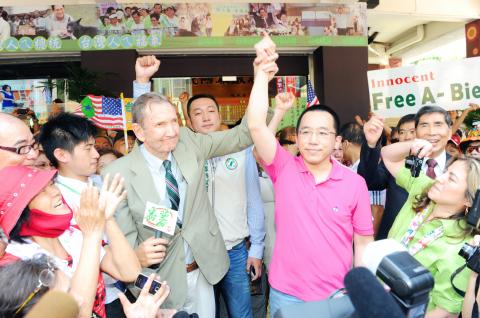The “dangerous game” of keeping imprisoned former president Chen Shui-bian (陳水扁) from access to appropriate medical care has been played for “too long and too far,” former US attorney-general Ramsey Clark said yesterday in Taipei, calling for Chen’s immediate release and international attention to his situation.
Clark, who is in Taiwan on a four-day visit, told a press conference yesterday evening that Taiwanese need to exercise their power and make their support of Chen heard, while the UN Human Rights Council in Geneva should pay attention to Chen’s case and do its duty.
Chen is serving a 17-and-a-half-year prison term on corruption charges. During his incarceration, he has complained about several physical ailments, including chest pains.

Photo: Chang Chung-i, Taipei Times
Chen was of clear mind and expression, but was “obviously weak” and was kept in a condition which would further undermine his health, Clark said of his one-hour meeting with the former president on Monday afternoon.
There was no reason for making Chen sleep and eat on the floor and live in a space that is less than 2m2, Clark said.
“And there is no time to be playing games with fundamental human rights,” he added.
Earlier yesterday, Clark visited Greater Kaohsiung, where he met Chen’s wife, Wu Shu-jen (吳淑珍), and Kaohsiung Mayor Chen Chu (陳菊).
He said there would not be peace and harmony in Taiwanese society before Chen’s human rights are respected, as most Taiwanese people found the way the administration of President Ma Ying-jeou (馬英九) is treating Chen unacceptable.
Anyone could tell from Wu’s worried face that she is concerned for her husband’s health even more than her own, he said.
Clark added that Chen could have been put under house arrest, as he would have received better treatment and it would have been a better environment for his health, as the possibility of Chen escaping is extremely low.
Clark attended a dinner banquet after the press conference, where hundreds of guests paid tribute to the former US official who fought for Taiwan’s democratic movement and its struggle for freedom.
An internationally renowned defender of human rights, Clark flew to Taiwan in 1980 to express concerns over what came to be known as the Formosa Incident, also known as the Kaohsiung Incident, during which riot police cracked down on protesters calling for political rights.
Clark is scheduled to visit the Ministry of Justice and to meet with Minister of Justice Tseng Yung-fu (曾勇夫) today, before concluding his four-day trip tomorrow.

Chinese spouse and influencer Guan Guan’s (關關) residency permit has been revoked for repeatedly posting pro-China videos that threaten national security, the National Immigration Agency confirmed today. Guan Guan has said many controversial statements in her videos posted to Douyin (抖音), including “the red flag will soon be painted all over Taiwan” and “Taiwan is an inseparable part of China,” and expressing hope for expedited reunification. The agency last year received multiple reports alleging that Guan Guan had advocated for armed reunification. After verifying the reports, the agency last month issued a notice requiring her to appear and explain her actions. Guan

A preclearance service to facilitate entry for people traveling to select airports in Japan would be available from Thursday next week to Feb. 25 at Taiwan Taoyuan International Airport, Taoyuan International Airport Corp (TIAC) said on Tuesday. The service was first made available to Taiwanese travelers throughout the winter vacation of 2024 and during the Lunar New Year holiday. In addition to flights to the Japanese cities of Hakodate, Asahikawa, Akita, Sendai, Niigata, Okayama, Takamatsu, Kumamoto and Kagoshima, the service would be available to travelers to Kobe and Oita. The service can be accessed by passengers of 15 flight routes operated by

GIVE AND TAKE: Blood demand continues to rise each year, while fewer young donors are available due to the nation’s falling birthrate, a doctor said Blood donors can redeem points earned from donations to obtain limited edition Formosan black bear travel mugs, the Kaohsiung Blood Center said yesterday, as it announced a goal of stocking 20,000 units of blood prior to the Lunar New Year. The last month of the lunar year is National Blood Donation Month, when local centers seek to stockpile blood for use during the Lunar New Year holiday. The blood demand in southern Taiwan — including Tainan and Kaohsiung, as well as Chiayi, Pingtung, Penghu and Taitung counties — is about 2,000 units per day, the center said. The donation campaign aims to boost

The Central Weather Administration (CWA) said a magnitude 4.9 earthquake that struck off the coast of eastern Taiwan yesterday was an independent event and part of a stress-adjustment process. The earthquake occurred at 4:47pm, with its epicenter at sea about 45.4km south of Yilan County Hall at a depth of 5.9km, the CWA said. The quake's intensity, which gauges the actual effects of a temblor, was highest in several townships in Yilan and neighboring Hualien County, where it measured 4 on Taiwan's seven-tier intensity scale, the CWA said. Lin Po-yu (林柏佑), a division chief at the CWA's Seismological Center, told a news conference